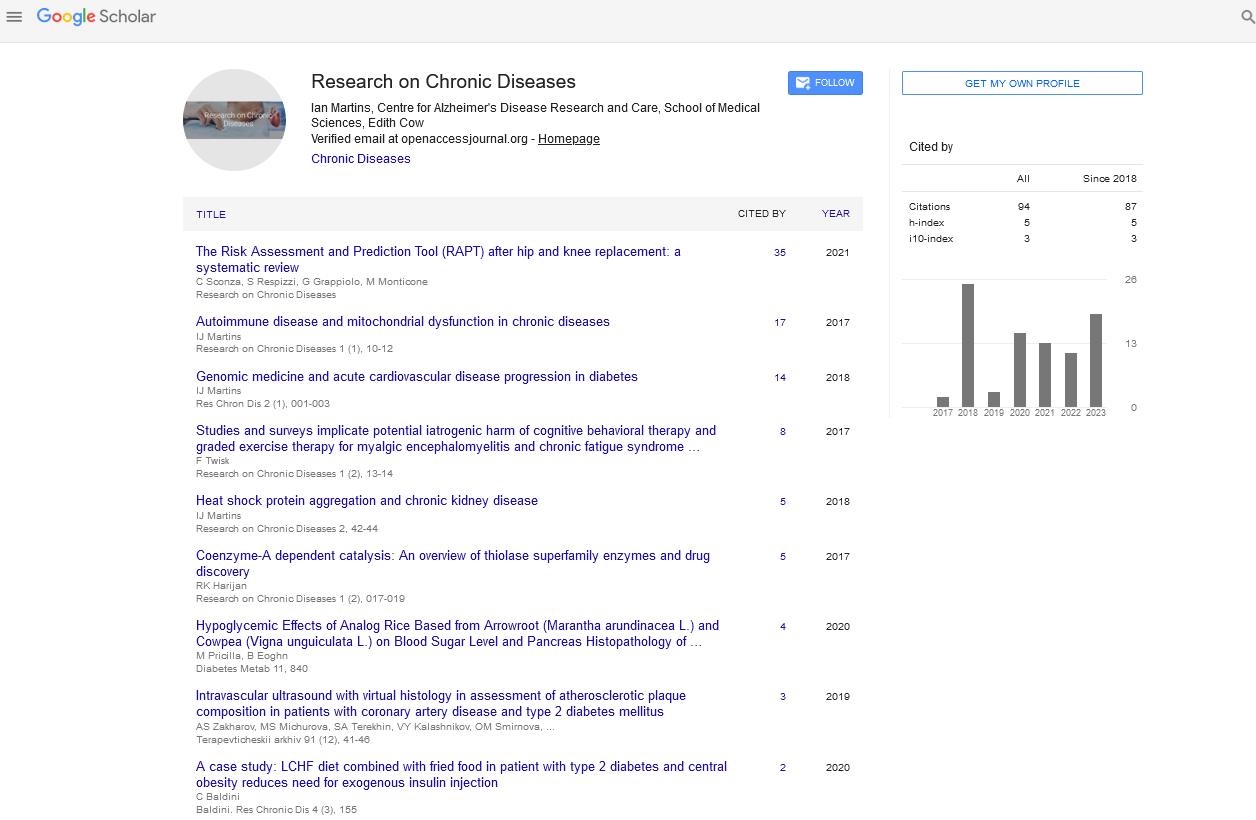Perspective - Research on Chronic Diseases (2023) Volume 7, Issue 6
Unraveling Hypertension: The Silent Threat and the Path to Managing Elevated Blood Pressure
- Corresponding Author:
- Ling-Na Kong
Department of Internal Medicine, Korea University, Seoul, South Korea
E-mail: kong@126.com
Received: 07-Nov-2023, Manuscript No. OARCD-23-119480; Editor assigned: 09-Nov-2023, PreQC No. OARCD-23-119480 (PQ); Reviewed: 23-Nov-2023, QC No. OARCD-23-119480; Revised: 30-Nov-2023, Manuscript No. OARCD-23-119480 (R); Published: 07-Dec-2023, DOI: 10.37532/OARCD.2023.7(6).119-120
Introduction
Hypertension, often referred to as high blood pressure, stands as a silent threat that affects millions globally. It’s a chronic condition that significantly impacts cardiovascular health and overall well-being. In this comprehensive article, we’ll delve into the intricacies of hypertension, exploring its nature, causes, effects, management, and strategies individuals can adopt to lead healthier lives while dealing with this common health issue.
Understanding hypertension
Defining hypertension: Hypertension refers to the force of blood against the artery walls being consistently too high. Blood pressure is measured in millimeters of mercury (mmHg), with two values: Systolic pressure (the pressure in the arteries when the heart beats) and diastolic pressure (the pressure in the arteries when the heart rests between beats). A blood pressure reading above 130/80 mmHg is generally considered elevated.
Types of hypertension: Primary (essential) hypertension, which develops over time with no identifiable cause, accounts for the majority of cases. Secondary hypertension results from an underlying condition such as kidney disease, hormonal disorders, or certain medications.
Description
Causes and risk factors
Underlying causes: The precise cause of primary hypertension is often unknown, but it’s believed to be a complex interplay of genetic and environmental factors. Secondary hypertension can stem from kidney disease, hormonal disorders, obstructive sleep apnea, or the use of birth control pills and other medications.
Risk factors: Several lifestyle and health-related factors contribute to the risk of developing hypertension. These include being overweight, lack of physical activity, high salt intake, excessive alcohol consumption, stress, and family history of hypertension.
Impact on health and daily life
Health implications: Hypertension is often referred to as the “silent killer” because it might not present noticeable symptoms until complications arise. Over time, high blood pressure can lead to severe health issues like heart disease, stroke, heart failure, and kidney disease.
Quality of life challenges
While individuals might not feel the effects of high blood pressure immediately, its silent progression affects daily life. Its potential for serious health complications, need for ongoing medical care, and lifestyle adjustments can lead to anxiety, stress, and a diminished quality of life.
Diagnosis and treatment
Diagnosis: Diagnosing hypertension involves regular blood pressure checks. It’s important to get accurate and consistent readings over time to confirm high blood pressure. Lifestyle factors and possible underlying health issues are considered during diagnosis.
Treatment approaches: The primary goal of hypertension treatment is to reduce blood pressure levels and prevent associated health complications. Lifestyle changes, such as a balanced diet, regular exercise, reducing sodium intake, and limiting alcohol, often form the first line of defense. If lifestyle changes are not enough, medications like diuretics, beta-blockers, ACE inhibitors, or calcium channel blockers may be prescribed.
Living with hypertension
Lifestyle modifications: Making changes to one’s lifestyle is pivotal in managing hypertension. Adopting a heart-healthy diet rich in fruits, vegetables, and whole grains, managing weight, staying physically active and quitting smoking can significantly help in controlling blood pressure.
Mental and emotional well-being: Dealing with a chronic condition like hypertension can take a toll on mental health. Seeking support from family, friends, or professional counselors, and learning stress management techniques can aid in coping with the challenges associated with high blood pressure.
Impact on social and work life: Hypertension can influence social interactions and work life due to necessary lifestyle modifications, medication schedules, and regular medical check-ups. Educating close circles about the condition can foster understanding and support.
Prevention and management strategies
Preventive measures: Preventing high blood pressure involves adopting a healthy lifestyle early on. This includes regular exercise, a balanced diet, limited alcohol intake, reducing stress, and avoiding tobacco use.
Managing progression: Regular blood pressure checks, adherence to medication if prescribed, and ongoing communication with healthcare providers are key in managing hypertension and reducing the risk of complications.
Conclusion
Hypertension, a common and potentially life-altering condition, poses significant challenges for individuals and their overall health. Understanding the causes, symptoms, and available management options is crucial for effectively managing this condition. While the journey with high blood pressure might be complex, proactive management, healthy lifestyle choices, emotional support, and proper medical guidance can empower individuals to lead fulfilling lives despite its presence. Increasing awareness, support, and access to comprehensive care are essential in enabling those affected by hypertension to navigate the complexities while striving for improved health and quality of life.
